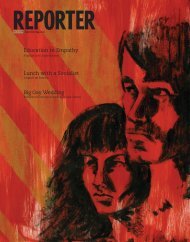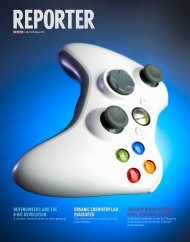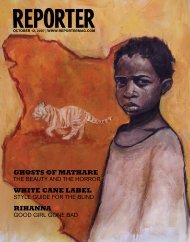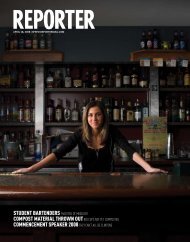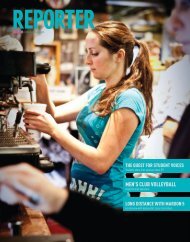Apologies - Reporter Magazine
Apologies - Reporter Magazine
Apologies - Reporter Magazine
Create successful ePaper yourself
Turn your PDF publications into a flip-book with our unique Google optimized e-Paper software.
A VOICE FOR OTHERS<br />
20 12 Leisure Features | 10.07.11 | 09.30.11<br />
Luticha<br />
Doucette<br />
by Ali Coladonato | photograph by Thomas Newton<br />
“It was truly a freak accident; our car just stopped in the middle of an intersection,” recalls<br />
Luticha Douchette, a fourth year Bioinformatics major. “I had to be revived — they told my<br />
mom I’d never wake up, they told her I’d be a vegetable, they told her I wouldn’t be able to walk,<br />
but here I am.” While the accident cost her the use of her legs, Doucette is still here, and she<br />
sees herself as a platform and a voice for others with disibilites.<br />
Doucette, however, is more than just a voice; she is a force, a visionary,<br />
and someone who has worked hard to bring about change. Whether<br />
improving wheelchair technology and accessibility on campus or<br />
addressing the nation as Ms. Wheelchair New York, Luticha has<br />
seized every possibility in her path. As she puts it, “I have a problem<br />
saying no to opportunity.”<br />
Growing up before the Americans with Disabilities Act was enacted,<br />
there were few places Doucette was able to go as a child. “Growing up<br />
I was really kind of isolated,” she says. “I was homeschooled for most<br />
of my life, which was a very lonely experience.” During her childhood<br />
she spent plenty of time in the library, the only place accessible to her.<br />
“Once a week my mom would take me there for a few hours, and I’d<br />
just sit and read,” she recalls.<br />
From these excursions, Doucette developed a great love for science<br />
and math. At 7 a.m. every Saturday, she would diligently wake up to<br />
watch “Bill Nye the Science Guy” and leaf through the Encyclopaedia<br />
Britannica. “Science was just something that appealed to me,” says<br />
Doucette. “I could contemplate these big things from the comfort of<br />
my room; it became a way for me to interpret the world.”<br />
Doucette has met and worked with many different people in her<br />
effort improve the world for herself and other wheelchair users. She<br />
likes to compare science to dating, saying, “People need to have that<br />
initial spark for any kind of innovation or collaboration to work.”<br />
With her conviction, Doucette has found dozens of<br />
individuals willing to help her put her ideas into action.<br />
Finding the lab benches in one of her chemistry<br />
labs too high and unsafe for her use, Doucette<br />
began talking with Gary Judge, a stockroom<br />
technician in the College of Science.<br />
Together they developed the idea of using<br />
adjustable benches to accommodate an<br />
even larger range of people, including<br />
those with power wheelchairs, which<br />
are generally taller than manual<br />
models. These benches can now be<br />
found in several labs, one in particular<br />
earning the alias “Luticha’s Lab”.<br />
With the help of third year Chemical<br />
Engineering student David Olney and fifth<br />
year Mechanical Engineering Technology<br />
student Devin Hamilton, Doucette has been working<br />
to develop remote controlled power wheelchairs. Using<br />
Bluetooth technology, users would be able to remotely guide<br />
their chair using a smartphone or tablet computer. This is helpful<br />
for wheelchair users getting into and out of bed or for loading empty<br />
wheelchairs into vehicles. Additionally, if the user were unable to<br />
control his or her own chair, a caregiver would be able to maneuver<br />
the chair without having to manually control its joystick. In its final<br />
stages, the project has already gained a lot of publicity.<br />
While she has a great respect for RIT and its students’ ambition,<br />
Doucette feels that RIT has done a poor job promoting innovation<br />
for disability research. “For a tech school, RIT really isn’t very techie<br />
as far as accessibility,” says Doucette. “There’s the opportunity for<br />
RIT to really push the limits with the technology here on campus in<br />
a field that’s always dynamic.” She cites many little obstacles that can<br />
make it difficult for her to get around; things like FMS disabling the<br />
automatic door-openers and forgetting to turn them back on, or the<br />
illogically placed ramps and elevators that she relies on. “People don’t<br />
really think about my ability to go anywhere freely,” says Doucette.<br />
“It’s always ‘Who’s taking care of you? Who’s with you?’ They don’t<br />
get that it’s about changing the environment to make the user as<br />
independent as possible.”<br />
It’s that sort of attitude that earned Doucette second runner-up<br />
in the Ms. Wheelchair USA pageant last month. Unlike traditional<br />
beauty pageants, Ms. Wheelchair USA is based on advocacy. It is<br />
designed to allow women with disabilities an opportunity to share<br />
their accomplishments and promote issues they think are important<br />
for those living with disability.<br />
When first approached by pageant officials, Doucette was hesitant.<br />
“Then I learned that it isn’t a beauty competition, it’s about being an<br />
advocate,” recalls Doucette. “Well I do that all the time, and I like<br />
shiny things, so I said ‘Why not?’” She recalls the inspiration she felt<br />
being surrounded by many women with similar goals. “Being around<br />
these people, I was more motivated than I ever had been before.”<br />
Doucette’s motivation and passion for life have led her to amazing<br />
places, including Canada, Hong Kong and Costa Rica, with many<br />
more trips in the works including a possible study abroad in China<br />
before graduation. With her thirst for experience and knowledge, her<br />
world knows no limits. She’ll continue pushing herself and everyone<br />
around her to greater understanding through her research, projects<br />
and, most importantly, by being herself.<br />
To find more information about the remote-controlled wheelchair,<br />
along with Doucette’s other projects, visit http://beta.innovation.rit.<br />
edu/csi2/main/node/lad7047.<br />
21





